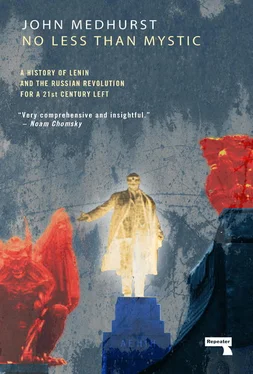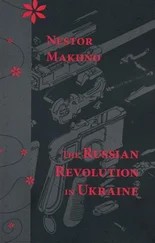In June, workers from textile mills, tram lines, printing shops and rail car plants in the city of Tver took strike action to protest the forced conscription of 10% of Tver’s workers into the Red Army. They also protested the lack of fair elections to the local Soviet. Unlike in Tula, the government decided to listen to the strikers, and the special commissar dispatched from Moscow to “liquidate” the strike, V.I. Nevsky, reported back that the strikers’ demands were justified. He also found that Tver’s local Communist Party commissars had been hoarding rations, accruing special privileges and behaving like petty tyrants. Nevsky negotiated with the elected representatives of the Tver strikers, conceded many of their demands were legitimate and recommended to Moscow that the local one-party dictatorship be ended. Because of this the rebellion in the town subsided. 27
Tver proved that not every manifestation of worker unrest needed to be dealt with in the bloody manner of Tula or the Putilov Works. Sometimes, as in Briansk, Orel and Smolensk, emissaries from Moscow honestly reported back that strikes were not “counter-revolutionary” but arose from real grievances. At the Eighth Party Congress in March 1919 the senior Bolshevik Nikolai Ossinski, previously head of the State Bank and now one of the leaders of the “Democratic Centralists” who criticised the lack of democracy within the rcp and the Soviets, told delegates honestly, “Rebellions that are going on are not White Guardist, they take place because our commissars behave disgracefully”. 28Ossinski and other Democratic Centralists openly warned of the danger of a “bureaucratic dictatorship”.
Tragically, this approach faltered in the provincial fishing town of Astrakhan. In spring 1919 it sat between Kolchak’s forces on the Volga and Deniken’s sweeping in from the northern Caucasus. If these had joined up they would have formed one united White Army front. This may explain the exceptional brutality with which a strike at Astrakhan’s metal plants and a rebellion by unwilling conscripted soldiers were put down. Communists and loyal Red Army units surrounded strike rallies and opened fire. Workers then joined with rebellious soldiers and fought back. Between 10th and 12th March there was heavy fighting throughout the town, which finally died down as the Communists reasserted control. The Cheka then carried out mass executions. 29
Writing in 1990 in the Slavic Review , Vladimir Brovkin, whose work on the 1918 and 1919 mass strikes against the Bolsheviks is invaluable to an accurate understanding of the period, considered that “the strikes of 1919 have remained a blank in Soviet history”. 30To a great extent they still are, yet they are the vital background to the 1921 Kronstadt uprising and proof that it did not arise from “anarchist elements” or a “monarchist conspiracy”, but was the culmination of a consistent and continuous working-class struggle for civil rights. The struggle took political form, but in great part it arose from protest against an intolerable industrial regime. Central to that regime was the imposition of the model of “scientific management” created by the American engineer Frederick Taylor onto Russian industrial workers.
Lenin’s passion for “Taylorism” said much about his conception of socialism. Taylor’s use of time-and-motion studies to make the tasks of the factory more automated and mechanistic had been utilised ruthlessly by American employers to restrict freedom within the workplace and reduce workers to heavily monitored drones. In theory Taylor’s ideas, explained in The Principles of Scientific Management (1911), were designed to increase efficiency by providing proper training for workers and ensuring they did not waste their time in boring, unproductive labour. In reality they were used by employers to squeeze every last atom of labour possible from their employees. In his major work, Taylor wrote,
It is only through enforced standardisation of methods, enforced adoption of the best implements and working conditions, and enforced cooperation that this faster work can be assured. And the duty of enforcing the adoption of standards and enforcing this cooperation rests with management alone. 31
This was meat and drink to the Bolsheviks. They were classic productivists, in thrall to a vision of increasing industrial production as the only route to economic development and social liberation. They did not question the value of unrestrained industrial growth, or demonstrate the distaste for its moral and aesthetic squalor found in the socialism of Morris, Carpenter and Kropotkin. Lenin, Trotsky and Stalin all saw the salvation and achievement of socialism in the development of the economy’s productive forces. Therefore any system of management, such as Taylorism, that produced measurable growth in the forces of production was by definition a good thing. Decentralised, grassroots control of production, as found in Factory Committees, self-managed firms or independent cooperatives, which all offered a different perspective on growth and on economic and social development, were deemed irrelevant at best and petty-bourgeois at worst.
The Bolsheviks were of their time. Socialist rhetoric aside, their conception of work reflected the Protestant Work Ethic and unquestioning acceptance of the need for daily, routine, compulsory work performed in order to secure the means of subsistence. Sadly, these attitudes define the work experience of 2017 as much as that of 1917. The zero-hours contract, to take the worst example, is designed for the employers’ convenience, with no regard for “work-life balance”. It is a concept rejected by the growing “Refusal of Work” movement, itself linked to a positive conception of “degrowth” as the necessary route out of social and ecological collapse.
The anarchist writer Bob Black’s influential essay “The Abolition of Work” (1985) argued that work itself is as much a source of exploitation, domination and hierarchy as the capitalist system or the state, and in a libertarian society would become voluntary “productive play”. Black argued that for most people (with the exception of a lucky few whose work corresponds to their vocation and talent) work consists of getting up in the morning at a time they would rather not, travelling in unpleasant conditions to a place they do not wish to be, spending most of their day doing something they do not enjoy in the company, and under the control of, people they have not chosen to be with. This usually involves little to no creativity or control of the work process. Marx had proposed the concept of alienated labour based on the lack of genuine consent in the work contract with the employer. Black claimed that all non-voluntary work was alienated.
In The Problem with Work: Feminism, Marxism, Antiwork Politics and Postwork Imaginaries (2011), Kathi Weeks added a feminist perspective to Refusal of Work by suggesting that whilst feminist campaigners had, rightly, fought for equal pay and the recognition of women’s unpaid work as a form of labour, they had thereby “depolitisised” work itself. In Weeks’ view feminism had unconsciously accepted a patriarchal concept of work as a moral duty and acknowledged that the employment relationship is how income is and should be distributed. David Graeber, the author of Debt: The First 5,000 Years (2011) also questioned the value of work as conventionally defined. His popular blog on “Bullshit Jobs” has disinterred Keynes’ belief that with technological advancement there is no need to work more than 15 hours a week, with free-time devoted to enjoyment and self-improvement.
Weeks and Graeber explicitly challenge that work, or compulsory labour of any kind, should define one’s identity and self-worth, or that refusal to engage in it should lead to social stigma or poverty. In the 1980s André Gorz laid out a conception of a “post-work” society. In Paths to Paradise and Critique of Economic Reason he claimed there was no longer any connection between increased productivity and the satisfaction of society’s needs. Computerised mass production made long hours superfluous. In a sane society people would work less for the same reward. But capitalism is not a sane society. Trade unions should recognise this and cease to be capitalism’s mirror image. In Gorz’s view, “Trade unionism cannot continue to exist as a movement with a future unless it expands its mission beyond the defence of the particular interests of waged workers”. 32The reduction in the amount of labour required should not mean furious and doomed attempts to preserve the handloom or the coalmine, but new strategies to shorten paid work hours while maintaining equitable distribution of rewards.
Читать дальше












